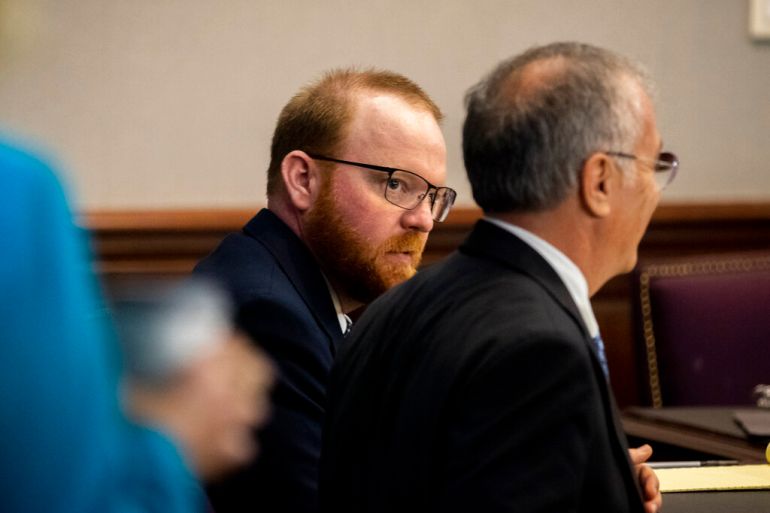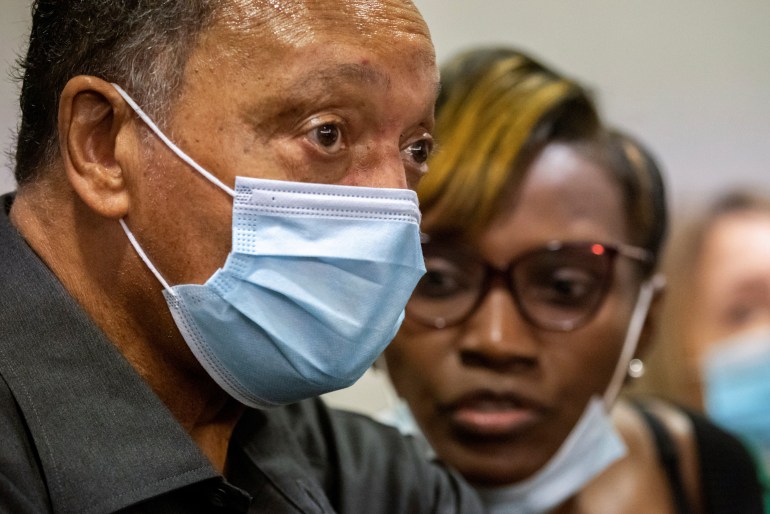Man who shot Ahmaud Arbery testifies it was ‘life or death’
‘When you pull a weapon on someone … usually that tells people to back off,’ said Travis McMichael who shot Arbery.

The man who fatally shot Ahmaud Arbery testified Wednesday that Arbery attacked him and grabbed his shotgun after he and his father pursued the 25-year-old Black man in their mostly white neighbourhood in the US state of Georgia
Travis McMichael’s testimony came as defence attorneys in the murder trial for the three white men accused of killing Arbery opened their case by building on arguments that their clients were lawfully trying to stop burglaries in their neighbourhood.
Keep reading
list of 4 itemsLawyer in Arbery murder trial asks for ‘no more Black pastors’
Ahmaud Arbery was killed based on assumptions, US prosecutor says
What to expect after jury seated in Ahmaud Arbery murder trial
Asked by his lawyer why he shot Arbery, McMichael responded: “He had my gun. He struck me. It was obvious that he was attacking me, that if he would have gotten the shotgun from me, then this was a life or death situation, and I’m going to have to stop him from doing this so I shot.”
McMichael said he thought Ahmaud Arbery was a burglar when he fatally shot and killed the man who was out for a Sunday run.
That McMichael took the stand in his own defence could be a risky manoeuvre that opens him up to questioning by prosecutors about evidence McMichael may have had “racial animus” towards Black people.
McMichael, 35, his 65-year-old father Gregory McMichael, and their neighbour William “Roddie” Bryan, 52 are charged with murder, aggravated assault and false imprisonment in the case. The three men, who are white, face life in prison if convicted of murder and have pleaded not guilty.
“I want to give my side of the story,” McMichael said.
The high-profile trial has taken on special significance as the US struggles with racial justice issues following the 2020 protests and civil unrest that rocked the country after the killing of George Floyd, a Black man, by a white police officer in Minneapolis.
The three men pursued Arbery in a pick-up truck on February 23, 2020 before the younger McMichael fired his shotgun three times at close range as Arbery ran towards him and appeared to reach for the weapon. McMichael has claimed he shot in self-defence.
The prosecution rested its case Tuesday after eight days of testimony from 23 witnesses. Defence lawyers have argued that the defendants thought Arbery, 25, might have committed a crime before they chased him and were trying to make a legal citizen’s arrest.
McMichael, 35, said there had been thefts in Satilla Shores, his neighborhood outside the small coastal Georgia city of Brunswick, that had put residents on edge.
He recalled a prior encounter with Arbery on the night of February 11, 2020, less than two weeks before the shooting that killed Arbery.
That night, he said, he saw Arbery outside an unoccupied, half-built house in the neighborhood. Prosecutors said Arbery was an avid runner out for one of his regular jogs.
McMichael said Arbery, was “creeping through the shadows” and then seemed to put his hand in the waistband or pocket of his shorts.
“It freaked me out,” he said. “I’m under the assumption that he’s armed.” He ran home to grab his gun and called the police, but Arbery had vanished by then.
McMichael testified that he believed Arbery might have stolen fishing equipment that had been reported missing by the owner of the half-built house and was returning on February 11 to take more things.
No evidence has emerged that Arbery took anything from the house.
The property owner had previously said through a lawyer that Arbery may have stopped at the construction site to drink from a water faucet. Arbery had nothing on him besides his running clothes and shoes the day he was shot.
McMichael described law-enforcement training he had during nine years he worked as a US Coast Guard mechanic.
Speaking calmly and often turning to address the jurors directly, the Reuters news agency reported, McMichael said he had the power of arrest and was trained on using force and the need for reasonable suspicion of a crime.
Although he never used physical force in his Coast Guard duties, he said had been taught that aiming a gun at someone can be used to deescalate a situation.
“When you pull a weapon on someone, from what I’ve learned in my training, usually that tells people to back off” and comply with orders, he told the jury.

Prosecutors say the defendants had unfairly assumed the worst about a Black man out for a Sunday run, and that none of the defendants were working as law-enforcement officers when they chased Arbery.
Bryan recorded cellphone video of Arbery being killed by Travis McMichael. The video caused outrage when it was published more than two months later.
Superior Court Judge Timothy Walmsley denied a request from defence attorneys to ban prominent civil rights leaders, including the Reverend Jesse Jackson and other high-profile visitors, from the courtroom.
Jackson sat with Arbery’s parents in the courtroom’s back row Wednesday for the second time this week. Attorneys for the defendants argued the presence of Jackson and others who have spoken out about racial injustice could unfairly influence the jury.